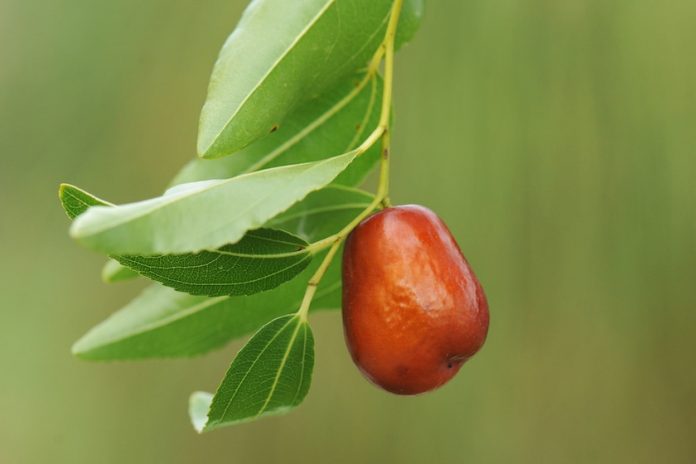
Are you familiar with the jujube candies that are often sold at movie theaters? At one time, these sweets contained the juice from the Ziziphus jujuba plant, which is also known as the jujube, red date, Korean date, or Indian date. The days of using real jujube juice in the candy are over, but that doesn’t mean we are done with jujube by any means!
In fact, jujube is gaining more and more recognition as a plant, fruit, and tea that provides not only some great culinary delights, but also is a source of various health benefits.
What is jujube?
The jujube is a small thorny tree or shrub that is in the buckthorn family. It produces an immature fruit that contains a seed in the center and tastes like an apple. The mature fruit is shriveled, looks like a small date, and often is enjoyed as a snack. The plant is widely distributed throughout southern Asia, northern India, central and southern China, parts of Europe, and the Caribbean.
Read about healthy snacks for children
Overall there are more than 400 varieties of jujube. Some varieties are best suited for eating fresh while others shine when they are consumed dry, which gives them a date-like consistency. If you want to eat jujube fresh, look for Chico, Honey Jar, Li, Sherwood, and Sugar Cane varieties. If you prefer dried fruit, then look for Lang and Shanxi Li.
How to enjoy jujube
Outside of North America, jujube is enjoyed in a variety of ways. In Vietnam, some people like to eat the fruits smoked, while the fruits are made into pickles in Bengal and Bangladesh. Dried fruits are enjoyed in China and Vietnam, while jujube tea is a favorite in Korea and China. The fruits also can be made into marmalades, juice, cakes, brandy, syrup, jam, and wine.
If you want to use jujubes in recipes, they can be used instead of apples or dates. Be sure to peel them and remove the seed before adding them to your recipe.
Health benefits of jujube
For thousands of years, the jujube has been a part of Chinese and Korean traditional medicine, where it was used to reduce stress and as an anti-fungal, antibacterial, anti-ulcer, and anti-inflammatory substance. Jujube also was used as a sedative, immuno-stimulant, wound healer, anti-spastic, and heart-healthy food.
Read about fighting inflammation with food
Although jujubes don’t stand out when it comes to any specific nutrient, they do contain a fair amount of calcium, copper, iron, magnesium, manganese, niacin, phosphorus, and potassium and a high level of vitamin C.
Recent research into the health benefits of jujube has turned up some important information on how it can improve health. For one thing, jujube has eight flavonoids, which are phytonutrients intimately involved in restoring health. Here’s how a few of them work. For example:
- The flavonoids spinosin and swertish are known to have sedative properties, which makes them helpful in treating insomnia and anxiety.
- The substance puerarin assists in lowering cholesterol and thus reducing the risk of cardiovascular disease.
- Apigenin is a flavonoid that has antioxidant properties as well as anti-tumor and anti-inflammatory abilities, which makes it helpful in reducing the risk of cancer and in promoting liver and digestive health.
- Extracts of these date-like fruits can also help restore skin health and appearance by reducing wrinkles, replenishing dry skin, and treating sunburn pain.
- Jujubes contain 18 of the most critical amino acids, which means the fruits have a role in the formation of proteins and assist in wound healing.
- The essential oil of jujubes has been shown to possess the ability to promote hair growth.
- Jujube extract can help with chronic constipation and related conditions
Jump into some easy recipes for candied jujube or jujube tea and enjoy the taste and health benefits of these small fruits.
Sources
Jiang JG et al. Comparison of the sedative and hypnotic effects of flavonoids, saponins, and polysaccharides extracted from Semen Ziziphus jujube. National Product Research 2007 Apr; 21(4): 310-20
Mercola J. What are jujubes good for? 2016 Oct. 26
Naftali T et al. Ziziphus jujube extract for the treatment of chronic idiopathic constipation: a controlled clinical trial. Digestion 2008; 78(4): 224-28
Price A. The top 7 health benefits of jujube fruit, including better digestion and immunity. Dr. Axe Food is Medicine 2016 Sep 17
Tahergorabi Z et al. Ziziphus jujube: a red fruit with promising anticancer activities. Pharmacognosy Review 2015 Jul-Dec; 9(18): 99-106
Yoon JI et al. Hair growth promoting effect of Zizyphus jujube essential oil. Food and Chemical Toxicology 2010 May; 48(5): 1350-54
Zheng G et al. Effects of puerarin on lipid accumulation and metabolism in high-fat diet-fed mice. PLoS One 2015 Mar 30; 10(3): e0122925










